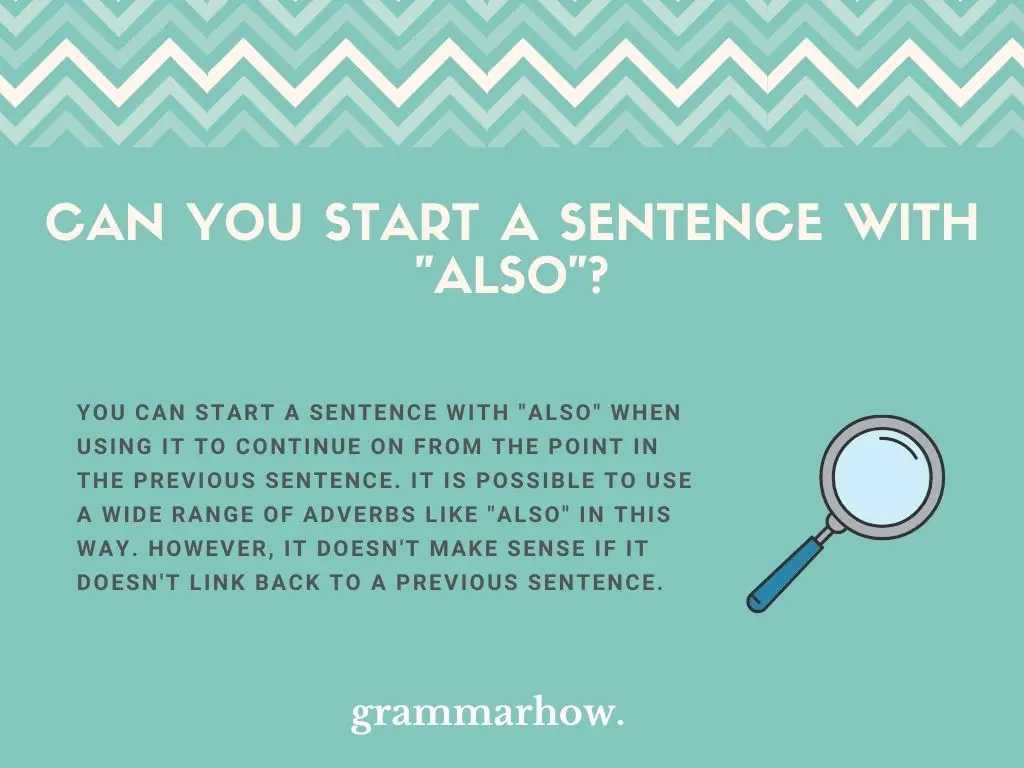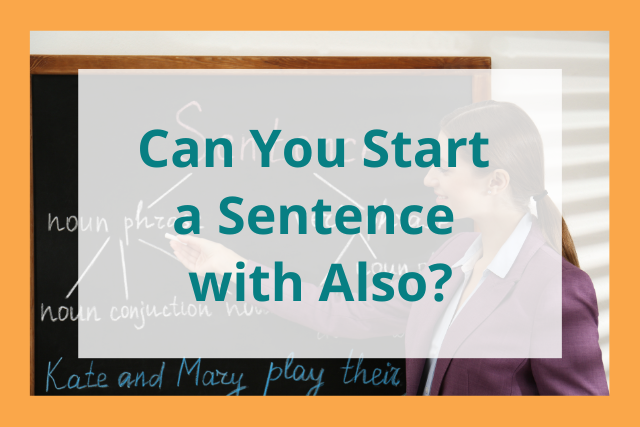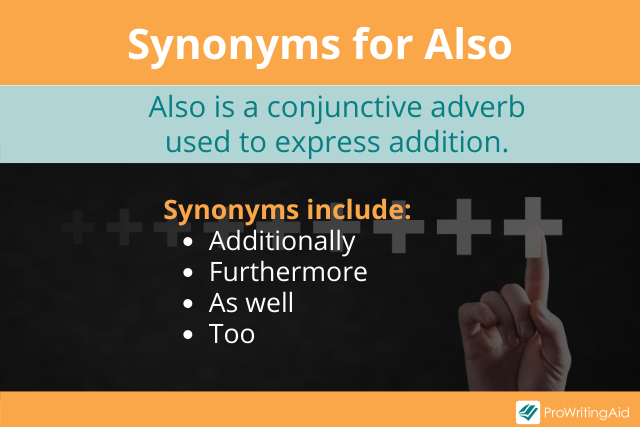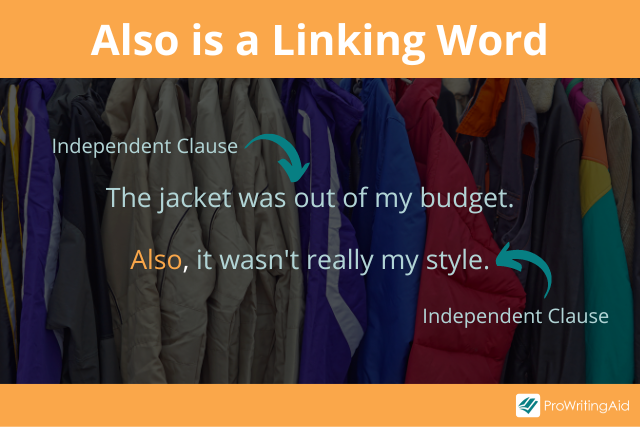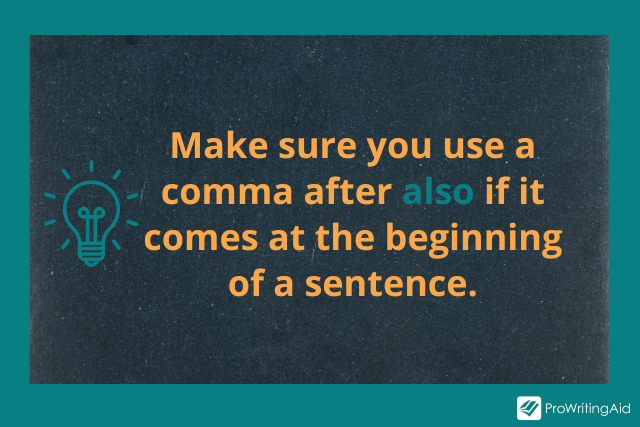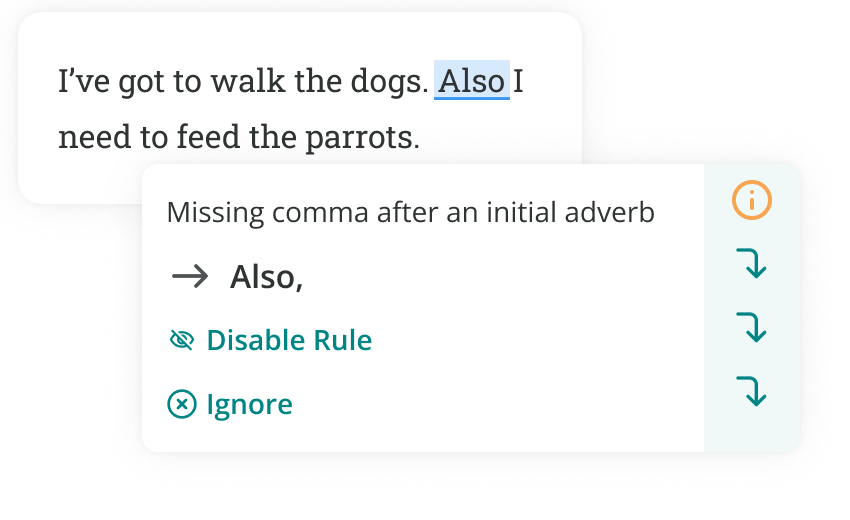There’s a common English language myth that teaches us how certain words cannot be used at the start of a sentence. While there are always exceptions, you can start sentences with more words than you realize. This article will look at starting a sentence with also.
You can start a sentence with “also” when using it to continue on from the point in the previous sentence. It is possible to use a wide range of adverbs like “also” in this way. However, it doesn’t make sense if it doesn’t link back to a previous sentence.
We typically use “also” at the start of a sentence to add more information. It works in the same way as you’d expect when we place it in the middle of a sentence, which helps us when it comes to explaining the intricacies of the word.
What Does “Also” Mean At The Beginning Of A Sentence?
So, why would we use “also” at the start of a sentence?
We simply use “also” in the same way we might use “and” or “furthermore.” It’s a continuation argument that helps us to elaborate on our point.
Most of the reason comes down to writing style. Sometimes, you might see the following sentence:
- He didn’t want to be there, and he wasn’t going to make it out, also he wasn’t sure whether it was worth his time.
While there isn’t anything strictly wrong with the above sentence, it’s far too lengthy. Many readers will back away from wanting to read a sentence like the above one.
Instead, you can do the following:
- He didn’t want to be there, and he wasn’t going to make it out. Also, he wasn’t sure whether it was worth his time.
Here, we’ve added a period before “also” and a comma after. This is correct punctuation for starting a new sentence with “also.” Remember, though; you must link back to the previous sentence and expand on the idea presented.
The following example won’t be enough on its own:
- Also, I had much to tell her.
Because there isn’t anything to link “also” back to.
Examples Of How To Use “Also” At The Beginning Of A Sentence
Some more examples will help you to get to grips with starting a sentence with “also.” Once you’ve read through these, you’ll be a master of the language rules surrounding it.
- He didn’t want to go and see her, so he thought he’d stay at home. Also, he’s probably not in her best books at the minute.
- We weren’t going to be there because we knew there was a lot to do. Also, it didn’t really strike us as a fun day out.
- You shouldn’t have come here because we now have to work twice as hard. Also, you’re never much use for the team.
- The government made a pledge to protect local wildlife. Also, they seemed to have taken more of an active stand on nature conservation.
- The teachers didn’t want to tell the children what to do for their homework. Also, the students weren’t exactly the easiest children to talk to.
“Also” works at the start of a sentence to continue on from the previous point. It works in the same way as “and,” but we use it at the start of a sentence when the previous sentence already has too many words or an extra clause in it.
Where Should I Place The Comma When Using “Also” At The Beginning Of A Sentence?
You might have noticed some of the punctuation rules already that come with “also.” You should learn how to punctuate it at the beginning of a sentence before using it and potentially getting it wrong.
You should place a comma after “also” at the beginning of a sentence. There are no other rules for comma placement, but you must always place a comma with no exceptions.
You can see that from the following examples:
- Correct: He didn’t want to go. Also, she wasn’t offering anyway.
- Incorrect: I didn’t have to be there. Also no one else did!
Without the comma, “also” doesn’t make sense. It’s supposed to add additional detail to the sentence to show us that there’s another point or thing that needs to be raised in the argument.
If we removed “also” from the sentence, the overall meaning should stay the same:
- Also, she wasn’t offering anyway.
- She wasn’t offering anyway.
Is It Informal To Use “Also” At The Beginning Of A Sentence?
Some people might be worried about the formality of using “also” in this way. While there are a few misconceptions surrounding starting sentences with words like “also,” does that mean they’re not formal?
There is nothing wrong with starting a sentence with “also” in both formal and informal writing. However, it’s more likely that you’ll come across it informally since there are better formal options.
You might prefer a formal alternative such as “furthermore.” This is much more common in most formal pieces of writing, especially when introducing an idea that you want to engage the readers with.
There are plenty of other options too, which show that “also” isn’t the best choice. However, “also” isn’t an informal word, which is why it’s possible to use it no matter what tone you’re writing with.
The only issue you might come across is the rarity of starting a sentence with “also.” It’s not something that’s done often. Most people would prefer a simpler “and” in place of it (even with formal writing).
Alternatives To Starting A Sentence With “Also”
Finally, let’s go over some alternatives to starting a sentence with “also.” The synonyms that we’ll highlight here can all start sentences in similar ways, so they make for excellent replacements instead of “also.”
- And
- Furthermore
- Surely
- Besides
- Not to mention
- Without forgetting
- To add
- In addition
- Along with that
- Don’t forget
These synonyms are all potential replacements for “also.” “Furthermore” is the best formal choice, while “and” is the best informal choice (though they are both interchangeable as well).
Martin holds a Master’s degree in Finance and International Business. He has six years of experience in professional communication with clients, executives, and colleagues. Furthermore, he has teaching experience from Aarhus University. Martin has been featured as an expert in communication and teaching on Forbes and Shopify. Read more about Martin here.
Is it ok to start a sentence with also?
Also, I had given him the file you sent me.
tchrist♦
132k48 gold badges366 silver badges566 bronze badges
asked Jan 11, 2012 at 3:23
2
Certainly, it is correct to begin a sentence with also. All adverbs (also inclusive) can be used at the beginning of a sentence with the proper punctuation. For instance, the first sentence in this answer begins with an adverb. Other examples are:
- Furthermore, we have exhausted all the other options.
- Definitely, you can use my car.
- Surely, he could do better.
- Besides*, she had my number and could have called.
*Note that Besides is used here as an adverb not a preposition.
answered Jan 11, 2012 at 3:40
Jimi OkeJimi Oke
27.1k2 gold badges77 silver badges106 bronze badges
8
As noted by other commenters, some writers prefer to avoid «Also, .. » in formal writing. But there is one use of ‘also’ at the start of a sentence which is in fact more prevalent in formal than in informal writing: namely, Also + adjective. Example:
- Also important is the pursuit of wealth and economic growth and power.
This uncommon syntax is called «fronting’.
answered Jan 11, 2012 at 9:23
ShoeShoe
32k4 gold badges51 silver badges105 bronze badges
1
Burchfield in Fowler’s Modern English Usage advises against it. He says it is now quite frequent, but still a «marked feature of uneducated speech».
I have always disliked it myself; a sentence can easily be recast to avoid it. I see it a lot, even in academic writing; but it is still considered informal or uneducated by some (it is hard to estimate their number, but they are probably a small minority); so, if you want to please traditionalists, don’t use it. If formality and style are not your primary concern, don’t bother trying to avoid it, and rest assured that most people would use it.
answered Jan 11, 2012 at 6:03
3
It is correct as long as you are continuing a line of thought, but you should limit its use to an informal register. Formal register, however, will require you to use a more sophisticated alternative such as Furthermore, to name one.
answered Jan 11, 2012 at 3:39
drakorgdrakorg
2,0101 gold badge15 silver badges17 bronze badges
2
Yes.
Also, it’s fine to start a sentence with And, But and many other words (mostly conjunctions) that some people are convinced they shouldn’t start with.
answered Jan 11, 2012 at 16:13
Jon HannaJon Hanna
52.6k1 gold badge113 silver badges192 bronze badges
7
As always, it’s not a matter of what’s correct, but rather of what works in a given context. Starting a sentence with also may be effective for some communicative purposes, but not for others. It just isn’t possible to give a single answer to such a general question.
answered Jan 11, 2012 at 9:34
Barrie EnglandBarrie England
139k10 gold badges240 silver badges400 bronze badges
This usage is very much correct. Especially when you are continuing the sentence from the other person.
Let’s look at an example conversation:
Person A: John has taken more than one hour now, to get the medicine from the store. I even made sure he got the right direction.
Person B: Also, I had given him my car to drive, so that he can reach quickly.
answered Jan 11, 2012 at 6:56
1
Many of your teachers have probably explained that you should only start sentences with certain words or parts of speech. Conjunctions have always been a no-no, but what about adverbs?
You can start a sentence with the adverb “also.” It is specifically a conjunctive adverb that we use to connect two independent clauses. “Also” indicates the addition of something, so when you use it to begin a sentence, it shows the relationship of the two clauses where one adds to the other.
Many people think adverbs are just words that modify adjectives or verbs differently. However, there is much more to them and how we use them in a sentence. Read on to find out more.
What Does “Also” Mean?
“Also” means “in addition” or “too.” We use it to add information to a previous clause or indicate the repetition of something someone said previously. It can appear within a sentence or at the start of a new one.
Example sentences:
- I have to pack up the whole house and also get ready for the arrival of a new baby.
- Mr. Darcy may have been proud, but he was also kind.
- I’m going to the housewarming, and Mary said she would also be attending.
“Also” is a conjunctive adverb, which means that, like a conjunction, we use it to connect two independent clauses. This causes it to function more like a subordinating conjunction, showing the relationship between the two clauses (source).
Example sentences:
- The magician showed everyone his hat. Also, the stage was quite empty.
- I kept my eyes down to avoid someone noticing me. Also, I was afraid.
- They walked for hours under the hot sun. Also, they were exhausted.
The previous examples show that “also” provides additional information. It creates an emphatic effect primarily but can also appear at a different point in the sentence. If you want to give more information but make it stand out, use “also” to start the next sentence.
How Do You Use “Also”?
Using “also” depends on the purpose of the sentence. Suppose you are using it to provide general additional information. In that case, you can use it at any logical point in the sentence. If you are using it for effect, it should appear at the start of a new sentence.
Using “also” as part of a sentence only provides additional information. It can also mean “as well as” or “too,” so it can agree with the previous part of your sentence.
Example sentences:
- The movie was great, and it also had my favorite actor!
- We have 10 fingers, and we also have 10 toes.
- I didn’t think we were also in danger, but they were coming for everyone.
When you use “also” at the start of the sentence, it should appear with a comma directly after the word. This creates a pause in the sentence, emphasizing the next part as necessary. When you use it without a comma in the middle of a sentence, the sentence remains declarative.
Example sentences:
- He’s coming over tonight and also bringing his girlfriend.
- He’s coming over tonight. Also, he’s bringing his girlfriend.
- They were born on the same day, at the same hour, and also in the same hospital.
- They were born on the same day at the same hour. Also, it was the same hospital.
Syntax with adverbs requires a lot of thought. Read “Which Is Correct: Not Yet or Yet Not?” to help you understand word order and how exactly to assemble sentences.
As you’ve seen in the previous sentences, the function of “also” does not change — it continues to provide additional information. But the addition of the comma does create a dramatic stop that makes the sentence after it more emphatic.
When Can You Use “Also”?
You use “also” when you wish to provide extra information or state that something or someone is doing the same action as the previous subject. “Also” has to appear next to the clause for which it provides extra information; this can be part of the same sentence, as a secondary clause, or as a separate sentence.
When “also” appears in the middle of the sentence, it should generally appear just before the main verb.
Example sentences:
- She looked terrific, and he had also worn his formal suit.
- Is Joseph also worried about his looks?
- You’re writing a book? I’m also writing one!
However, we use “also” after when there is an auxiliary verb. If a sentence has two auxiliary verbs, then “also” should only appear after the first one.
Example sentences:
- She looked amazing, and he also dressed up for their fancy date night.
- Different holiday destinations are also in the pamphlet.
- In this class, you will also be working on your pottery pieces.
There are occasional exceptions, especially when describing something or someone with an adjective or directly referencing the object itself.
Example sentences:
- Not only was he caring, but he was also great at cooking!
- I’m also his friend, so he should have invited me.
- There is also a weekly newspaper released in the small town.
When “also” appears at the start of a sentence, you can then follow it with the rest of the independent clause, as long as it has a comma right after.
In What Context Can You Use “Also”?
There is no specific context where “also” should be the only word you use. Its purpose is to contextualize extra information. Hence, you should use it to tell your audience more about something.
You can use “also” in formal and informal writing and verbal communication.
“Also” works for many different scenarios. It is more likely to appear in a written text than in spoken communication because we prefer the simpler adverb “too” while speaking.
Because it has a similar meaning to “as well” and “too,” you can use “also” to express these ideas when showing the relationship between two clauses. “Also” does not fall under the usual adverb types like manner, degree, or frequency.
“Also” is a conjunctive adverb. It functions as a conjunction while telling us that the second part of the sentence or clause relates to the first by providing extra information. Another conjunctive adverb that provides additional information is “in addition.”
There are a few scenarios where you may want to provide extra information. One of the ways to do this is through a list, but when you want to emphasize a point, then using the adverb “also” sets apart the additional information to make it more noteworthy.
Example sentences:
I bought everything for the tacos: beef, peppers, lettuce, and cheese.
I bought everything for the tacos. There’s beef, peppers, lettuce, and also some cheese.
Edward was the King of the United Kingdom and the Emperor of India.
Edward was the King of the United Kingdom. Also, he was the Emperor of India.
As you can see, the addition of “also” is not always necessary, and there are other ways to provide additional information, but it does provide a more emphatic element to that information.
When Not to Use “Also”
You should never place “also” at the end of a clause. We use “too” and “as well” instead at the end of the sentence. We only use “also” in positive statements because there are other words that function better in negative statements.
Because we use “also” to provide extra information, and the assumption is that the extra information follows the conjunctive adverb, you cannot place “also” at the end of a sentence because there is no other information that follows.
We have already discussed where you should place “also” within a sentence. However, there are specific points where its usage is definitely incorrect.
If you do wish to indicate that there is additional information at the end of the sentence, then “too” or “as well” are grammatically accurate synonyms that you can use instead of “also.”
Example sentences:
- I bought the tickets, and I also booked the limo for our prom.
- I bought the tickets and booked the limo for our prom as well.
- I bought the tickets and booked the limo too!
You cannot use “also” as part of a negative statement. This is because additional information in a negative form uses “either,” “nor,” or “neither.” For example, the sentence “I don’t have a good relationship with my brother and also with my sister” is incorrect.
Example sentences:
- I don’t have a good relationship with my brother, nor with my sister.
- I’m not coming to the party, and neither is he.
- They’re not under pressure, and they’re not fine either.
If adverbs mix you up, you may be interested in an article discussing the difference between “well” and “good.” Read “Doing Well or Doing Good: Can Both Be Correct?” to understand when you should use these specific words.
What Can You Use Instead of “Also”?
“Also” has several synonyms that you can choose from. As we’ve mentioned previously, “too” and “as well as” are common synonyms with similar meanings.
Example sentences:
- I wanted to help them, but everyone in the town wanted to help as well.
- Since my sister rejected him, I told him I had a cousin, too, who might be interested.
- As well as his younger sister, he had many older brothers.
Other words and phrases that we can use instead of “also” are “additionally,” “furthermore,” and “moreover.” Their connotation is somewhat formal, though, so we cannot use these as perfect synonyms.
Example sentences:
Furthermore, she informed him about the problems before he signed the lease.
Additionally, we believe this is an entirely new discovery that will revolutionize modern medicine.
Moreover, we are waiting for her response to continue the acquisition.
On the other hand, there are decidedly less formal synonyms, and we are more likely to use them in verbal communication instead of written. Phrases like “on top of that” and “over and above” are examples.
Example sentences:
- Not only did I get a new phone, but I also got a new smartwatch on top of that.
- Over and above, we are fighting for the end of the war.
Not all of these phrases are perfect synonyms, but they all suggest the same idea; hence, they are all viable alternatives you can use instead of “also.”
Using “Also” in a Full Sentence
As we’ve discussed, we can use “also” in a variety of ways. We can use “also” to provide extra information and set off a statement providing additional information.
When it appears in the second clause, it provides additional information to the initial clause. When it appears in a clause on its own, some context does need to be provided to explain the additional information.
Example sentences:
- I enjoyed sitting on the beach, but we also went swimming every day.
- Even though things seem bleak, there is also kindness and good in the world.
- Jenny is also my boss.
In the final sentence, we assume that there was some kind of discussion about bosses that prompted this utterance about Jenny being someone’s boss. “Also” also helps to focus the reader’s attention.
Focusing Adverbs
“Also” is a focusing adverb. Others know it as an adverb of focus or focus adverb. A focus adverb is an adverb that sets apart a clause or makes it more obvious. It generally points to verb phrases, although it can also work for other phrases like nouns, prepositions, adjectives, and adverbials.
As a standard adverb, “also” appears in the middle of the sentence. It gives us more information about the clause, telling us who, where, or what is also doing something (source).
Example sentences:
- She wasn’t impressed, and it seemed like she had also lost her sense of humor.
- I also go running every week.
- While I was there, I also met a celebrity chef. Her food was amazing!
As a focusing adverb, “also” brings the reader’s attention to a specific clause. We often use it for effect, both serious and humorous. “Also” is not the only focusing adverb. Other focusing adverbs include “especially,” “just,” “only,” and “particularly” (source).
Focus adverbs can both limit and add to the sentence. “Just” and “only” are examples of limiting focus adverbs, while “also” and “as well” are examples of additive adverbs. This article was written for strategiesforparents.com.
Example sentences:
- He only wanted to go to the party.
- Just Shawn will be coming to the party.
- Also, Leah is bringing the snacks for the party.
- I’ve hired a clown for the party, as well as organizing the cake.
Final Thoughts
“Also” is one of the more common adverbs in the English language. We use it in both written and verbal communication, and it has an important function: providing additional information. Especially in our time, additional information is key for positive, clear communication.
As a focusing adverb, “also” sets off a statement or idea. When we use it at the start of the sentence, it draws the reader’s attention and emphasizes your point.
Many people wonder if the English language accepts sentences starting with also.
Can you start a sentence with also? The answer is yes! It’s perfectly okay to start a sentence with also in both formal and informal writing, as long as that sentence continues the same train of thought as the previous sentence.
Read on to learn more about how to use also to start sentences.
How to Use Also in a Sentence
Also is a conjunctive adverb that is used to express addition. Common words with similar meanings include additionally, and, furthermore, as well, and too.
Let’s take a closer look at how to use also correctly, both at the beginning of a sentence and in the middle of one.
Using Also to Start a Sentence
When you use also at the beginning of a sentence, it functions as a linking word to connect that new sentence to the previous one. It adds a new idea that builds on the previous idea and makes it clear the two ideas are related.
For example, imagine you’re trying to explain to someone why you didn’t buy a jacket you tried on at the store.
Your first sentence might be: “The jacket was out of my budget.”
Your second sentence could be: “Also, it wasn’t really my style.”
In this case, the word also links the expensiveness of the jacket to the fact that the jacket wasn’t your style. Using this linking word makes it clear that these two sentences are both contributing to the same point—the explanation for why you didn’t buy the jacket.
It’s important to remember that using also at the start of the sentence can make that sentence feel like an afterthought.
In the example above, the fact that the jacket wasn’t your style feels less important than the fact that it was out of your budget, because you started the second sentence with also.
As a result, you should be mindful about using also to start a sentence in scientific writing, since it might weaken the sentence, even though it doesn’t break any grammar rules.
Using Also in the Middle of a Sentence
When you use also in the middle of a sentence, it means the same thing as in addition or as well. Here, the purpose of also is to join two words or phrases together.
You might say, “The girl was sad, lonely, and also hungry.” This sentence means the same thing as the following sentence: “The girl was sad, lonely, and hungry as well.”
In some scenarios, you can use also in the middle of a sentence to link that sentence to the previous one, just like when you use also at the beginning of the sentence.
For example, you might say, “Einstein was a brilliant physicist. He was also a talented violin player.” These two sentences could be combined and rewritten as: “Einstein was a brilliant physicist. Also, he was a talented violin player.”
Examples of Starting a Sentence with Also
The best way to learn grammar is by reading plenty of examples. Here are some more examples of sentences that begin with also.
- It’s important to stay hydrated while you’re at the beach. Also, make sure to apply sunscreen to protect your skin.
- I didn’t go to the dance because I didn’t have a date. Also, I hate dancing.
- Mom needs you to run to the grocery store because we’re out of milk. Also, can you get some strawberries while you’re there?
- My best tip for succeeding as a writer is to practice writing as often as you can. Also, read lots of books.
- I want to get a dog because it would make me feel less lonely when I’m alone in the house. Also, dogs are cute.
- My daughter is on the varsity tennis team. Also, she plays soccer at the local park.
- Don’t forget to lock the door when you leave. Also, turn off all the lights in the house, so we don’t waste electricity.
How to Use Also to Start a Sentence
If you use also at the beginning of a sentence, you should make sure that sentence relates to the previous sentence or adds another point to the same overall idea.
If not, readers will be confused about the inclusion of the word also, since its purpose is to link two thoughts together.
Make sure you use a comma after also if you use this word to start a sentence. You don’t always need a comma if also is in the middle of the sentence, but it’s always proper punctuation to use one if it’s at the beginning.
Conclusion on Can You Start a Sentence with Also?
So there you have it! Starting a sentence with also is grammatically correct. Just make sure you’re building on the previous sentence, and that you use a comma.
Also, don’t forget to run your work through ProWritingAid to check for grammar errors! ProWritingAid can detect missing commas when you start sentences with linking words like also or and.

-
#1
Is it OK to put «also» in the beginning of a sentence?
«Also you can do it this way».
-
#2
It sounds awkward to put it in the beginning of that particular sentence. You can use «also» at the beginning of a sentence to introduce more information to a previous fact, for instance: «The economy in the USA is going through rough times these days. Banks are struggling and the value of homes is rising. Also, many employees are being laid off».
-
#3
Thanks, curlyboy20. I did not even expect such a clear explanation. Thanks, again.
-
#4
Is it OK to put «also» in the beginning of a sentence?
I am not sure «why», but it seems to me that some native speakers object to this use of «also». I have been told that when you utilize «also» at the beginning of a sentence it suggests that your writing is just a list!
-
#5
It looks like an afterthought, which is fine if your sole aim is to communicate meaning. In careful writing, if you need to add something to a sentence you would take the trouble to integrate it properly.
-
#6
Hello Veli,
Thanks for your contribution.
Please note that «also» could only be used as an adverb. It is not a conjunction.
Take a look at this:
also. The word is an adverb, & not a conjunction ; nevertheless, it is often used in the latter capacity where and (also), but also, or as well as, would be in place. In talk, where the informal stringing on of after-thoughts is legitimate, there is often no objection to this; & the deliberate afterthought may appear similarly in print;
But it is the writer’s ordinary duty to settle up with his after-thoughts before he writes his sentence, & consequently the unassisted also that is proper to the after-thought gives a slovenly air to its sentence.
A Dictionary of Modern English Usage — Henry Watson Fowler
-
#7
Is it OK to put «also» in the beginning of a sentence:
You can start a sentence with any word in the English language (as long as the context justifies it).
-
#8
Hello Veli,
Thanks for your contribution.
Please note that «also» could only be used as an adverb. It is not a conjunction.
Take a look at this:A Dictionary of Modern English Usage — Henry Watson Fowler
I wasn’t aware of of what Fowler said back then, but I agree with his advice. An afterthought is an afterthought, so whether you begin your thought with an adverb or any other part of speech, it’s your own affair. It’s a case of putting your thoughts into writing as they occur to you, rather than crafting your written work carefully.
Which we don’t always need or want to do.
-
#9
I was taught to never start a sentence with «also», «but», «and», «in other words», etc. I graduated from school and have been ignoring that rule ever since. And I will continue to ignore that rule unless someone proves to me that it is truly wrong. But don’t get me wrong I am not telling you to ignore those rules. In other words, do as I say, not as I do…
-
#10
You can tell anybody to ignore that ‘rule’. It’s poppycock.
-
#11
Always be polite! Also angry customers want to be taken seriously.
Is also possible at the beginning of the sentence or should it be:
Even angry customers want to be taken seriously or
Angry customers also want to be taken seriously.
-
#12
Always be polite! Also angry customers want to be taken seriously.
![Thumbs Down :thumbsdown: :thumbsdown:]()
It’s possible, but it sounds as if your two sentences are unrelated. I have to think about it to understand the relationship. Also, it sounds like a direct translation from Dutch.
The first sentence is perfect for this context.
The second sentence would sound ok if you have mentioned happy customers earlier, perhaps.
Continue Learning about English Language Arts
Can you start a sentence with the word otherwise?
Yes, you can start a sentence with the word «otherwise.» It is a
prepositional phrase, and like other prepositional phrases, it can
be used to start a sentence.
Can you start a sentence with ‘No’?
No, you cannot start a sentence with «no» unless you need to do
so. No reason exists not to start a sentence with that word, as you
can see. No one will care if you do start a sentence with it.
How do you start a sentence?
You start a sentence with a capital letter . The first word in a
sentence is always a noun or an article.
What is another word you can use at start of sentence instead of i?
The expression, » As for myself, I … »
also,
» In my opinion …», » I believe ….»
When is it proper grammar to use the word me at the beginning of a sentence?
It is not proper to start a sentence out with the word me.
The word “also” means “too” or “in addition.” Normally, the word “also” goes before a simple past or present tense verb, but goes after the verb “to be” and any auxiliary or modal verbs.
Examples:
The well may have produced 258 b/d of heavy oil, but it also produced a lot of sand. (before simple past tense)
This downhole tool not only measures temperature, but it also measures pressure.
(before simple present tense)
She may be a lawyer, but she is also a registered petroleum engineer.
(after verb “to be”)
If we exceed our production target by 20%, each of you will also receive a new car.
(after an auxiliary verb)
The manager plans to attend the meeting, but the vice president might also attend.
(after a modal verb)
If the word “also” refers to an entire sentence, then it goes at the beginning of the sentence with a comma after it.
Example:
Turn in your expense account. Also, your timesheet needs to be filled out.
This entry was posted on February 4, 2011 at 2:03 am and is filed under Uncategorized. You can follow any responses to this entry through the RSS 2.0 feed.
You can leave a response, or trackback from your own site.

